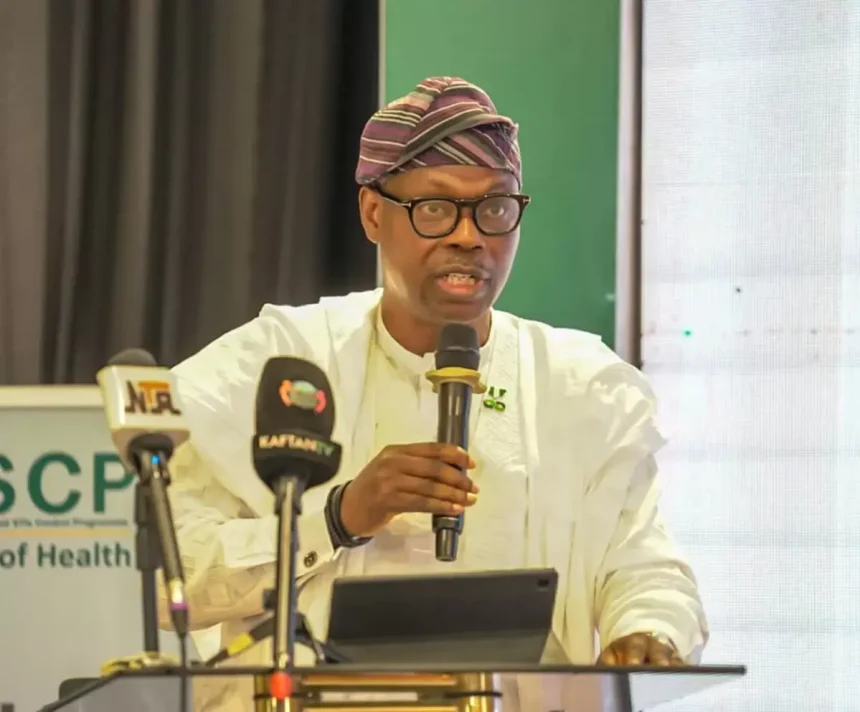
Minister of State for Health and Social Welfare, Dr. Iziaq Adekunle Salako, has pledged the Ministry’s commitment to tackling the power challenges facing Nigeria’s health sector.
Speaking at the end of the 1st National Stakeholders’ Dialogue on Power in the Health Sector, Salako stressed the importance of power in the health sector and the need for collective efforts to address the challenges.
He said, “We know that power is critical to health, and we need to work together to ensure that our health sector receives the power it needs to function effectively,” Salako said.
ALSO READ: FG to scale up empowerment for women
He praised the dialogue for providing a platform for stakeholders to discuss the challenges and potential solutions to the power crisis in the health sector.
The Minister pointed out the importance of accurate diagnosis of the problems facing the health sector, noting that the dialogue had provided a good understanding of the challenges. “Once we have an accurate diagnosis, then the problem is half solved,” he said.
Salako commended the participants for their commitment to finding solutions to the power crisis in the health sector. “Our vision is that when we meet again in two years to review, we will have at least improved power in the health sector by not less than 50%,” he said.
The Minister thanked all participants for their contributions to the dialogue and pledged the Ministry’s commitment to working with other stakeholders to improve power in the health sector.
Also speaking, the Technical Assistant to the Minister of State, Dr. Olakunle Daramola, while reading the communique, announced that the 1st National Stakeholders’ Dialogue on Power in the Health Sector has ended with a commitment to improve power supply in Nigeria’s health facilities.
According to Daramola, the dialogue achieved its objectives of assessing and reviewing the existing power policy environments, exploring renewable energy options, and strengthening public-private partnerships for electricity supply.
“We’ve been able to learn a lot of lessons, gain a few experiences, and then explore options, renewable energy options, and then strengthen public-private partnerships of electricity supply,” he said.
Daramola noted that the dialogue emphasized the importance of a stable power supply in healthcare delivery, citing the significant financial strain and compromised services in hospitals nationwide due to the current energy deficit. “Electricity is central to healthcare delivery, and incessant outages directly cost lives,” he said.
The dialogue also highlighted the need for better coordination and alignment of efforts by various funders and development partners. “The efforts of various funders and development partners can be better aligned and coordinated,” Daramola said, adding that a coordination framework was proposed for implementation.
Daramola outlined the next steps, which include instituting a powerful national coordination framework, scaling globalization with a national party, and institutionalizing operational and monetary frameworks. “Our next step will be to take advantage of this to be a process to build on,” he said.
The dialogue concluded with a commitment to develop domestic-level solutions, create sustainable digital and real-private systems, and integrate energy into a better plan.
“We maintain a multi-stakeholder compact with clear KPIs, including having a compact implementation monitoring unit,” Daramola said.
The stakeholders aim to review achievements and assess progress at the next gathering, with a focus on implementing the action plan and improving power supply in Nigeria’s health sector.
WATCH TOP VIDEOS FROM NIGERIAN TRIBUNE TV
- Let’s Talk About SELF-AWARENESS
- Is Your Confidence Mistaken for Pride? Let’s talk about it
- Is Etiquette About Perfection…Or Just Not Being Rude?
- Top Psychologist Reveal 3 Signs You’re Struggling With Imposter Syndrome
- Do You Pick Up Work-Related Calls at Midnight or Never? Let’s Talk About Boundaries






